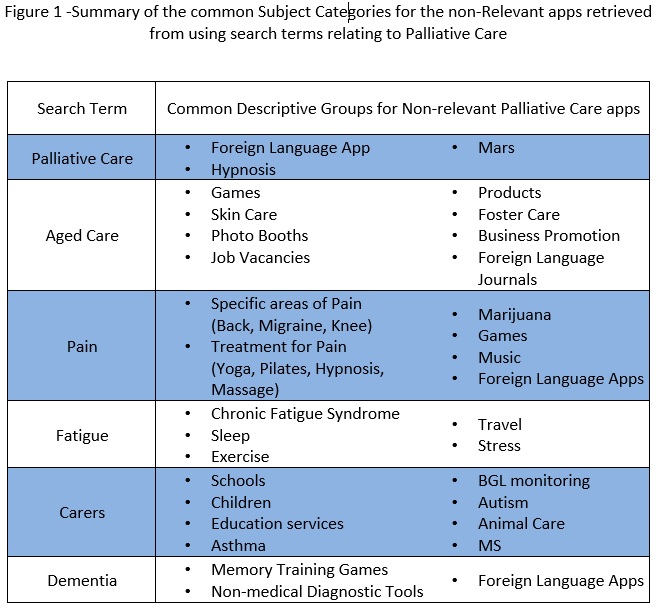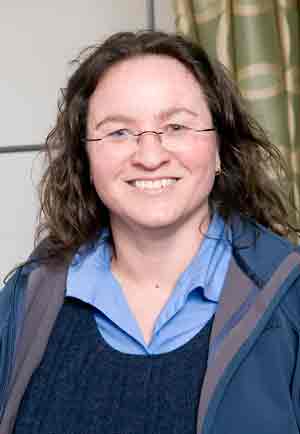Have you ever wondered why it's difficult to find a useful and relevant palliative care app when you need one?
A blog post written by Amanda Adams, Project Officer, GATI Project, Decision Assist program and CareSearch Research Assistant
In 2013, Canalys (1) estimated there were over 1,600,000 apps available in the two largest online app stores, iTunes and Google Play, and the number of platform-based, service carrier or manufacturer-operated online stores have increased to over 70 worldwide in the last two years (2). With over 1.2 billion people now accessing mobile applications (3), the role of the app has become multidimensional, with users expecting to discover an app to enhance every part of their life, for both work and play. For healthcare professionals (HCPs) working in palliative care, searching, evaluating, identifying, and downloading relevant apps from the proverbial sea of applications is a time-consuming pastime which often yields few results.
In 2014, CareSearch, as a member of the Guidance and Technological Innovation (GATI) team in the Decision Assist program, embarked on a process to develop palliAGED, a palliative care app that would assist primary health professionals in their provision of palliative care to older Australians in the community and residential aged care. As part of the palliAGED development process, the GATI project team conducted a scoping study to trawl through the thousands of apps available to HCPs. Not only did the study identify apps that were both relevant and useful, it also highlighted missing content areas which could provide a niche position in the marketplace for a locally-developed palliative care app that fills a need for clinical information.
Searching the app stores: You don’t always get what you ask for…
When consumers search for an app within the iTunes and Play app stores, intuition implies that the use of search terms that have the highest relationship to the specific area of interest would provide the most retrievals. For example, the most common search strings that HCPs working in palliative care could use include terms such as palliative care, dementia, pain, carers, aged care, or fatigue. When searched within online app stores, these terms should turn up some relevant apps that would be useful to support clinical care. In fact, from our scoping study, we found that if you search using one or a combination of these strings, your chances of finding any app that is relevant and useful is extremely remote.
When these search terms (and three others) were used to search within both of the major app stores, around 2,800 from a possible 1.6 million apps were returned relating to the actual strings used. On further analysis, approximately 200 of these were relevant to palliative care and of those, only one third were marketed effectively – that is, their description matched their function. Approximately half of the remainder were created for carers and families. When care setting and intended audience were considered and the list revised for HCPs specifically, we were able to identify only 10-15 apps that would be classified as relevant to HCPs in a palliative care setting (residential aged care or in the community).
Overwhelmingly, our search retrieved over 2,500 apps whose search strings are categorised as not-relevant to either their function or description, and whose relationship to palliative care could be classed as tenuous at best even though they were retrieved using terms relating to palliative care. Figure 1 provides a summary of the common categories the non-relevant apps were grouped into by search term used.

There are implications for both HCPs and for organisations developing apps, not only for palliative care, but also in other medical fields. As a consumer, HCPs would find that using iTunes and Google Play as a source of locating useful and relevant apps to support clinical practice is time-consuming and will not necessarily yield a result - not only due the sheer volume of apps now available online, but also due to the variability in the marketing and descriptors that app developers upload to the online stores. For organisations trying to reach HCPs with a quality product in a crowded marketplace, marketing and promotion of their app becomes an issue for the same reasons.
The GATI approach with palliAGED and our new app, palliAGEDnurse, is to enlist the help of those organisations that provide support to HCPs to assist in promoting and marketing the product directly to the intended user. This provides an avenue for HCPs to rapidly access relevant and useful apps whilst providing a sense of trust and reliability in the end product.
References
- Alto, P. Top iOS and Android apps largely absent on Windows Phone and BlackBerry 10. Published online. https://www.canalys.com/newsroom/top-ios-and-android-apps-largely-absent-windows-phone-and-blackberry-10. 23 May 2013.
- Cooper, J. A List of Mobile Appstores. Published online. www.Mobyaffiliates.com/blog/mobile-app-stores-list. 10 May 2012.
- Whitfield, K. Fast growth of apps user base in booming Asia Pacific market. Published online. 12 March 2013.
Editor’s note: The palliAGEDnurse app is scheduled for release in mid-May. If you’d like more information about it, please comment here or contact caresearch@flinders.edu.au.
Once released, it will be available on the palliAGED smartphone apps page

Amanda Adams is a project officer with the GATI Project within Decision Assist and a CareSearch Research Assistant.